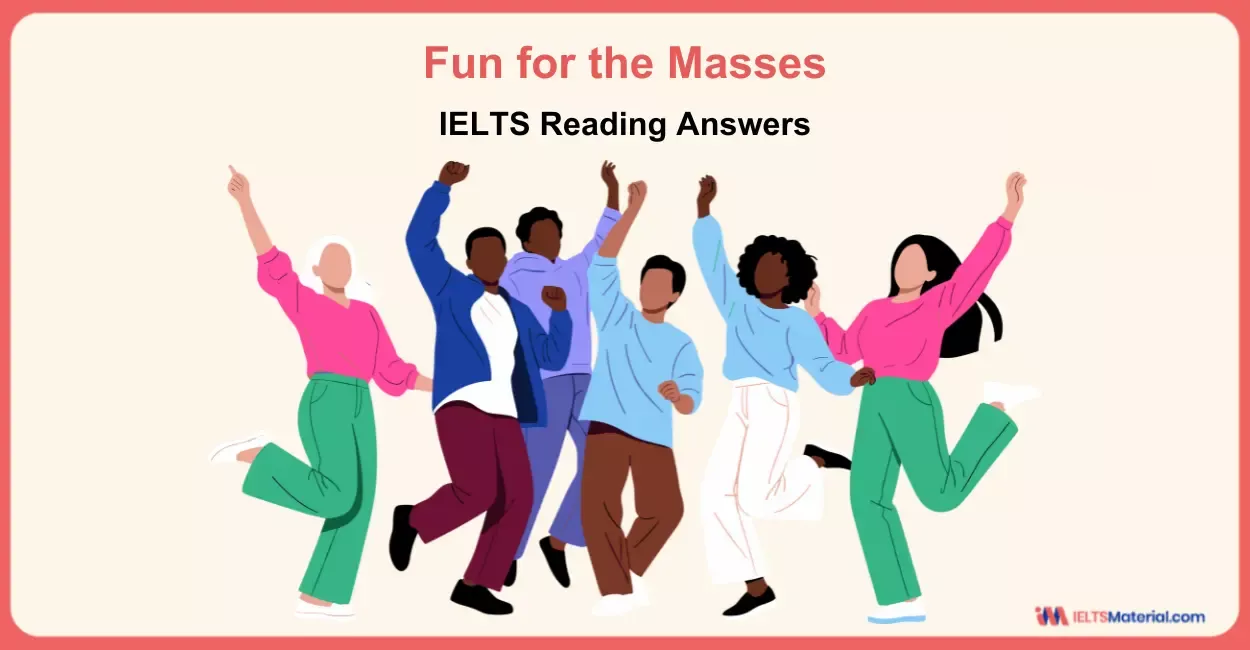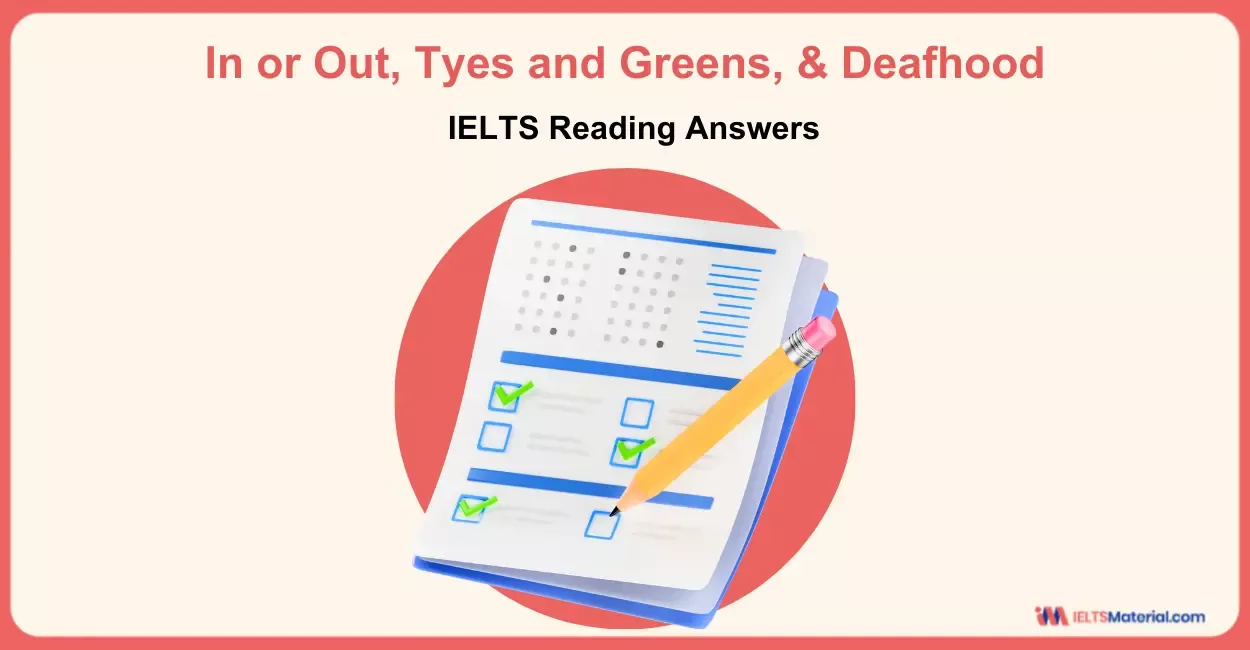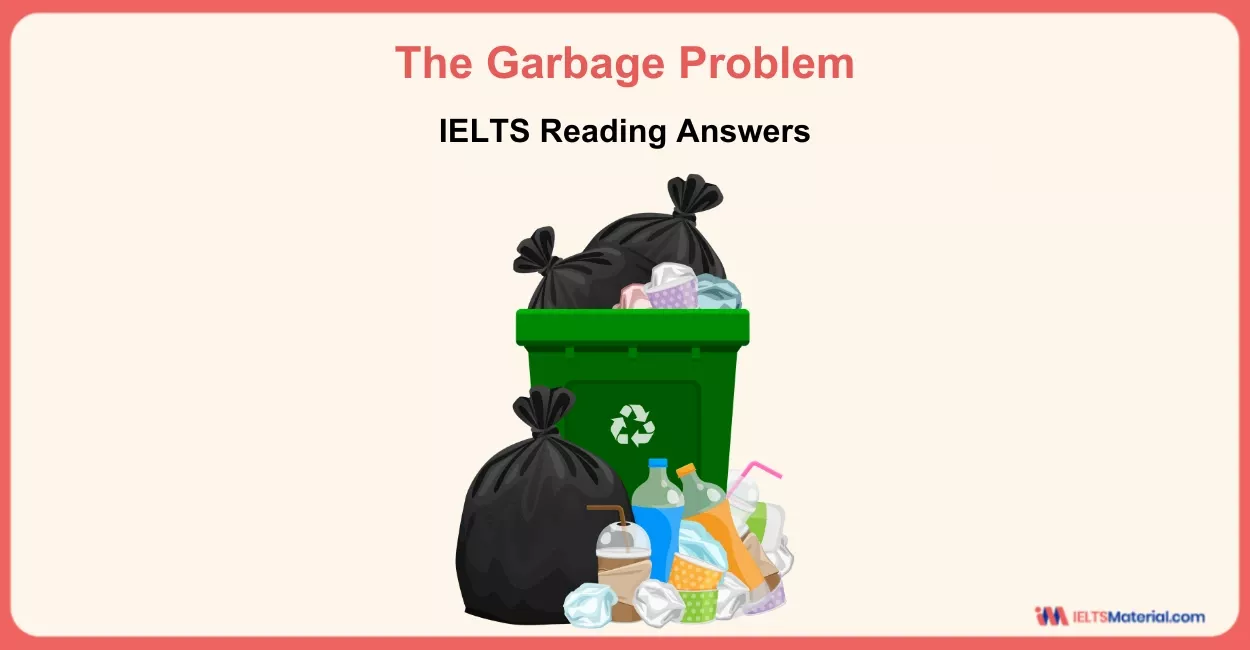The Garbage Problem - IELTS Reading Answers
9 min read
Updated On
-
Copy link
Want to practice more Multiple Choice Types of questions in the IELTS Reading? Attempt questions in the passage on 'The Garbage Problem' while learning the steps to follow in answering the questions to increase your reading and comprehension skills.
Table of Contents

Limited-Time Offer : Access a FREE 10-Day IELTS Study Plan!
In the reading passage on ‘The Garbage Problem’, it does not just test your reading speed but rather assesses how much you can understand and critique the written texts. Therefore, every answer that you write will matter, starting from locating facts to recognizing arguments and opinions. This would require you to have an accumulated knowledge about the criteria that surely helps you prepare with focus towards increasing your band score in the IELTS Reading Section.
With the passages which have appeared in the IELTS, you are taking a step towards getting your desired band scores. Remember to critically analyze the correct answer to understand the patterns which you follow. In this way, you can elevate your preparation and build confidence for the exam day.
Connect with our band 9 IELTS Trainers to crack your IELTS Reading in no time! Book a FREE Demo.
Types of Questions in IELTS Reading Passage ‘The Garbage Problem’
Getting the appropriate knowledge on the question types is always advantageous since you can then apply the specific strategy for each question type. Remember that going through them individually before reading the entire passage would be beneficial in terms of analyzing the information given. Let’s focus on these questions which you would have to answer in this passage on ‘The Garbage Problem’.
Tips to Answer Multiple Choice Questions in ‘The Garbage Problem’
Multiple Choice Questions in the Reading section of the IELTS Exam can seem tricky because such questions would test your comprehension skills. Also, at the same time, you need to critically compare the options that may seem very closely aligned with each other. Therefore, to answer these questions correctly given in ‘The Garbage Problem’, a systematic method should be followed rather than just guessing the answers. The following table will guide you step by step in tackling multiple-choice questions confidently.
|
Steps |
Strategy |
Description |
|
Step 1 |
Read the question carefully |
|
|
Step 2 |
Highlight keywords in the options |
|
|
Step 3 |
Skim the passage for context |
|
|
Step 4 |
Read carefully around the surrounding text |
|
|
Step 5 |
Eliminate incorrect options ones |
|
|
Step 6 |
Match meaning instead of keywords |
|
|
Step 7 |
Double-check your answer before finalizing it |
|
Curious to learn how to improve your reading skills to get a band 9? Check out the video below!
IELTS Reading Passage on ‘The Garbage Problem’
You should answer Questions 1-8, which are based on the Reading Passage below.
The Garbage Problem
A Garbage is a big problem all over the world. People buy and use a lot of things nowadays. After a while, they throw them away in the garbage bin. All the garbage is later thrown away or dumped outside the city. These places are called landfill sites. In many cities, landfill sites are now full.
B About one-third of all the garbage is made of paper. Another third of the garbage is a mix of glass, metal, plastic, and wood. The final third comes from food scraps. These are remains of food that are not eating any more. Food scraps are not a big garbage problem for the environment. Our natural world can get rid of food scraps. Insects and bacteria eat the food scraps and make them go away.
C But this does not happen with other materials. Plastic is very toxic to the environment. It poisons the earth and the water. We use plastic for many things, such as combs or pens. Also, when we buy something from the supermarket, we get a plastic bag. As soon as we get home, we throw the bag away. Plastic is also used to make Styrofoam. All take-out coffee cups and fast-food boxes are made of Styrofoam. When we buy coffee and drink it on the street, we throw that cup away too.
D Other garbage we throw away is metal. The cans for soft drinks or beer are made of aluminium. Aluminium is toxic too. The paper and wood we throw away are not toxic. But we have to cut down many trees every year to make paper and wood. Our environment suffers when there are no forests around. The air is less fresh, and the earth dries up. With no water in the earth, plants cannot grow.
Solutions to the garbage problem
E We have to manage our waste and garbage better. If we throw away so many things, soon we will have no place to dump them.
F The best thing to do is to reduce the amount of garbage. If we use less, we throw away less. For instance, we can buy food in big boxes and packages. Then we throw away only one box every month or so. Otherwise, we throw away many small boxes or cans every day.
G Similarly, we can reuse a lot of packaging. For example, we do not have to buy take-out coffee in Styrofoam cups. We can bring our own cup from home and fill it with fresh coffee. We also do not have to take the plastic bags from the supermarket. We can bring our own cloth bag from home instead. When we pack lunch, it is better to use a lunch box than a paper bag. Instead of paper plates, we can use real plates. We can clean up with a dishtowel, not a paper towel. We can use a compost bin for food scraps. In this way, the food gets back into the earth. It does not get mixed up with the regular garbage.
H Finally, all paper, glass and metal we do use, we can recycle. In many countries, there are now recycling programs. In Germany, for example, people separate all glass bottles by colour. Then they put the bottles into special bins that are on the street. The city collects the glass, cleans it, and reuses it. As well, in most countries, people recycle newspapers and cardboard. It is easy and efficient.
Questions 1-6
Choose the correct letter A, B, C or D
1 What is the topic word of the first passage?
- Throw away
- Garbage
- Plastic
- Environment
2 What is the main idea of the second passage?
- People must deal with garbage better.
- People should reuse things.
- People should recycle more.
- People should reduce their waste.
3 Why does the author say that garbage is a big problem?
- Because people buy too many things.
- Because people throw away everything they buy.
- Because not all cities have landfill sites.
- Because landfill sites get fewer and fewer.
4 What do people throw away?
- Paper and wood
- Plastic, glass and metal
- Food scraps
- All of the above
5 Why does the author mention Germany at the end of the reading passage?
- To suggest that recycling is the best solution to the garbage problem
- To offer additional advice about how to handle waste
- To criticize countries that do not have a recycling program
- To demonstrate that recycling works
6 Why should people not throw away Styrofoam cups?
- Because they are toxic to the environment.
- Because they can reuse them again at home.
- Because they can buy take-out coffee in them.
- Because they can fill them again with fresh coffee.
Questions 7-8
What advice does the author give about reusing waste?
Choose TWO letters, A-D.
A We should drink take-out coffee.
B We should use our own bags, cups and plates.
C We should throw away food in the compost bin.
D We should clean glasses ourselves and recycle them.
Grab the IELTS Reading (Academic) Test Guide: Essential Tips, Strategies, and Practice Tests” (April-June 2025) today!
Answers with Location and Explanation on Passage ‘The Garbage Problem’
How was it? Did you find all the answers? Let’s look at the correct answers with the location and explanation for the passage on ‘The Garbage Problem.’ It would help you to spot your weak points before moving on to similar passages or question types. If you keep practicing this, you will sharpen your skills and enhance your chances of getting a higher IELTS Band Score.
|
Answer |
Question Type |
Answer Location |
Answer Explanation |
|
1. B |
Multiple choice questions |
Paragraph A, line 1 |
The first part of the passage deals with the source of garbage. Garbage and its proper disposal has become a global problem. Hence, the answer is B. |
|
2. A |
Multiple choice questions |
Paragraph E, line 1 |
This part of the passage states that people must learn to manage their garbage better and provides suggestions for better waste management. Hence, the answer is A. |
|
3. D |
Multiple choice questions |
Paragraph A, lines 3-4 |
The author states that while previously garbage used to be disposed of in sites outside the city, these are now getting filled up. So, cities are running out of landfill sites which causes garbage to become a major problem. Therefore, the answer is D. |
|
4. D |
Multiple choice questions |
Paragraph B, lines 1-2 |
The garbage that people get rid of contains a large amount of paper and the rest is a combination of glass, metal, plastic, and wood. The remainder consists of food scraps. Hence, the answer is all of the above, which is option D. |
|
5. D |
Multiple choice questions |
Paragraph H, lines 2-4 |
In Germany, people separate all glass bottles by colour and then put them in special bins. This is then collected by the city and cleaned and reused. The author cites this as an example to show that recycling can be effective. Hence, the answer is D. |
|
6. A |
Multiple choice questions |
Paragraph C, lines 1-2 |
Plastic is very toxic to the environment and is toxic for the earth and the water. Since Styrofoam cups are made of plastic, they are also toxic for the environment. Hence the answer is A. |
|
7. B |
Multiple choice questions |
Paragraph G, lines 2-6 |
The author suggests that we can reuse waste by bringing our own reusable cups, using cloth bags instead of plastic, using a lunch box instead of a paper bag to pack lunch, and using dish towels and real plates instead of their paper counterparts. These measures would allow us to reduce and reuse waste. Hence, the answer is B. |
|
8. C |
Multiple choice questions |
Paragraph G, lines 6-7 |
The author also recommends that we use a compost bin to reuse food scraps which will enable the food to get back into the earth and not get mixed up with other garbage and get wasted. |
Enroll into our Free IELTS Webinar and learn more about techniques to improve your reading speed.
As you attempt different passages like this one on ‘The Garbage Problem’, you will train yourself to think faster and answer strategically under pressure. Do a focused practice along with reviewing your mistakes which will help you develop the required reading skills. Therefore, familiarize yourself with appropriate methods to get your desired band score of 8+.
Check More IELTS Reading Answers
Also Check:
Practice IELTS Reading based on question types

Start Preparing for IELTS: Get Your 10-Day Study Plan Today!
Explore other Reading Practice Tests

Nehasri Ravishenbagam

Nehasri Ravishenbagam

Kasturika Samanta

Nehasri Ravishenbagam
Recent Articles

Nehasri Ravishenbagam

Haniya Yashfeen

Haniya Yashfeen

Haniya Yashfeen




Post your Comments